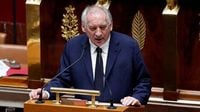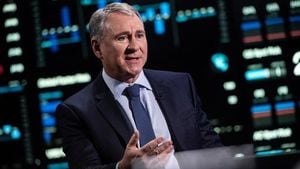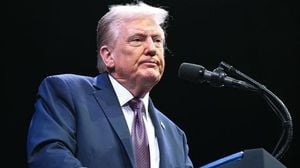France was plunged into fresh political and economic turmoil on Monday, September 8, 2025, as Prime Minister François Bayrou was ousted in a dramatic confidence vote in the National Assembly. The defeat—364 votes against and 194 in favor—marks the second collapse of the French government in less than a year and leaves President Emmanuel Macron facing a daunting task: naming a new prime minister amid a fragmented parliament and mounting public anger.
The vote was triggered by Bayrou’s controversial plan to slash public spending in a bid to rein in France’s ballooning debt, which now stands at an eye-watering 114% of GDP. The proposed €44 billion ($51–52 billion) package included scrapping two public holidays, freezing government spending, and making deep cuts to social welfare. Bayrou, who had been in office for nine months, staked his leadership on winning approval for these austerity measures, hoping to reduce the deficit from 5.8% of GDP in 2024 to around 4.6% by 2026—still nearly double the European Union’s 3% ceiling.
But the plan proved deeply unpopular across the political spectrum. According to Al Jazeera, opponents from both the far left and far right denounced the cuts as unfair, arguing they would hit the most vulnerable in French society. Even some conservatives, typically Bayrou’s allies, turned against him. As Natacha Butler of Al Jazeera reported from Paris, “For Bayrou, this is a crushing defeat. Certainly a large majority voted against him and his austerity budget.”
Bayrou, a 74-year-old centrist with a long political career, addressed lawmakers before the vote with a stark warning: “You have the power to bring down the government, but you do not have the power to erase reality. Reality will remain relentless: expenses will continue to rise, and the burden of debt, already unbearable, will grow heavier and more costly.” He added, “We broke the social contract with younger generations.”
The defeat leaves President Macron with few good options. As CNN noted, Macron must now either appoint a new prime minister or dissolve parliament and call early elections, though he has resisted the latter in the past. His office said a new appointment would be made “in the coming days.” Yet with the far left and far right now holding the largest blocs in the 577-seat parliament, and both eager to see one of their own in the top job, Macron’s ability to name another centrist is in serious doubt.
The revolving door of French prime ministers has become a headache for Macron. Bayrou was his third prime minister in just a year and a half, following the short tenure of Michel Barnier, who lasted only three months before being forced out by parliament. According to NPR, this instability can be traced back to Macron’s gamble last year, when he called a snap election after the far-right National Rally performed strongly in the European Parliament elections. The result was a splintered parliament and a weakened centrist bloc, making governance increasingly difficult.
Political journalist Thierry Arnaud described the situation to NPR as “disastrous” for Macron: “Macron will try to do everything he can to avoid putting the far right in charge of the government, but it’s not necessarily obvious that he will have that option.” The far-left France Unbowed party, for its part, declared the vote “signifies that Macron’s policy’s by the rich and for the rich, and his social war against the people is over.” Its leaders, along with the far right, have called for Macron himself to resign, though there is little chance of that happening with two years left in his term and his approval rating languishing around 15%.
Marine Le Pen, doyenne of the far right, took to social media to demand a snap election, declaring, “This moment marks the end of the agony of a phantom government.” Her party stands to gain the most from any new vote, with recent polls suggesting the National Rally would come out on top, followed by the left, and Macron’s centrist bloc a distant third.
The stakes go beyond party politics. France’s economic woes are deepening. The country’s deficit is the widest in the European area, and government bond yields have climbed above those of Spain, Portugal, and Greece—countries once at the heart of the eurozone debt crisis. Investors are jittery, and a possible downgrade of France’s sovereign debt rating, due for review on Friday, September 12, threatens to further undermine confidence. As Hugo Drochon of the University of Nottingham told Al Jazeera, “The biggest concern, at least from the financial markets, is not so much what’s going to be done, but that something gets done. They want a prime minister and a budget that actually addresses these issues.”
The political gridlock shows no sign of easing. Both the far right and far left have signaled they would immediately call for another vote of no confidence if Macron appoints another centrist. Naming a prime minister from one of their camps, however, would likely be blocked by the other side. Even before the vote, the prospect of Bayrou’s downfall had sparked calls for nationwide protests. The far left has called for demonstrations under the banner “Let’s block everything,” with trade unions planning further mobilization on September 18.
The crisis comes at a precarious moment for France and Europe. With wars raging in Ukraine and the Middle East, instability in Paris is seen as a gift to adversaries like Russian President Vladimir Putin, who have long delighted in Europe’s internal divisions. According to CNN, “Instability in Paris is a gift to both Russian President Vladimir Putin and his US counterpart Donald Trump, who share a common delight in mocking Europe’s weaknesses.”
Looking ahead, Macron faces the unenviable task of steering the country through turbulent waters. Any new prime minister will inherit the same fractured parliament and the same budgetary challenges that brought down Bayrou. The Socialists want to tax the rich and roll back corporate tax cuts—red lines for the conservative Les Republicains, whose support is essential for any coalition. As the Financial Times and others have observed, France’s fiscal mess is unlikely to be resolved soon, and public trust in the political class is at a low ebb.
For now, the French people wait—some with hope, many with frustration—as the fate of their government, their economy, and their future hangs in the balance. The next few days will be critical, not just for France, but for the wider European project.






